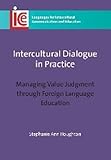Intercultural Dialogue in Practice : Managing Value Judgment through Foreign Language Education / Stephanie Ann Houghton.
Material type: TextSeries: Languages for Intercultural Communication and EducationPublisher: Bristol ; Blue Ridge Summit : Multilingual Matters, [2012]Copyright date: ©2012Description: 1 online resource (224 p.)Content type:
TextSeries: Languages for Intercultural Communication and EducationPublisher: Bristol ; Blue Ridge Summit : Multilingual Matters, [2012]Copyright date: ©2012Description: 1 online resource (224 p.)Content type: - 9781847697257
- 9781847697264
- 303.48/2 23
- P94.6 .H68 2012eb
- online - DeGruyter
| Item type | Current library | Call number | URL | Status | Notes | Barcode | |
|---|---|---|---|---|---|---|---|
 eBook
eBook
|
Biblioteca "Angelicum" Pont. Univ. S.Tommaso d'Aquino Nuvola online | online - DeGruyter (Browse shelf(Opens below)) | Online access | Not for loan (Accesso limitato) | Accesso per gli utenti autorizzati / Access for authorized users | (dgr)9781847697264 |
Browsing Biblioteca "Angelicum" Pont. Univ. S.Tommaso d'Aquino shelves, Shelving location: Nuvola online Close shelf browser (Hides shelf browser)

|

|

|

|

|

|

|
||
| online - DeGruyter TheCreativity Market : Creative Writing in the 21st Century / | online - DeGruyter Growing Up with Languages : Reflections on Multilingual Childhoods / | online - DeGruyter Language and Learning in Multilingual Classrooms : A Practical Approach / | online - DeGruyter Intercultural Dialogue in Practice : Managing Value Judgment through Foreign Language Education / | online - DeGruyter TheCommon European Framework of Reference : The Globalisation of Language Education Policy / | online - DeGruyter European Multilingualism : Current Perspectives and Challenges / | online - DeGruyter Youth Culture, Language Endangerment and Linguistic Survivance / |
Frontmatter -- Contents -- Figures and Tables -- Series Editors’ Preface -- Preface -- Introduction -- Part 1: Exploring the Roots of Value Judgment -- 1. Information Processing, Socialisation and the Self -- 2. Ethnocentrism and Ethnorelativism -- 3. Theoretical and Political Perspectives upon Value Judgment -- Part 2: Managing Value Judgment in Foreign Language Education -- 4. Overview of the Study -- 5. The Intercultural Dialogue Model -- 6. Critically Analysing Self and Other -- 7. Critically Evaluating Self and Other -- 8. Shifting the Interface: From Self and Other to Self and Society -- Conclusion -- References -- Index
restricted access online access with authorization star
http://purl.org/coar/access_right/c_16ec
The term intercultural dialogue has become a buzzword at policy level, but there is a pressing need to synchronise the terminology of policymakers with that of academics. An overarching aim of this book is to explore the wide-ranging terminology relevant to intercultural dialogue in order to promote clearer consideration of the underlying issues. More specifically, this book reports the findings of a research project conducted in Japan that brought teaching practice to bear upon some of the main conflicting theoretical perspectives on how value judgment should be managed in foreign language education. At the heart of this issue lies the management of prejudice, which is a key dynamic in intercultural dialogue that brings many other factors into play.
Mode of access: Internet via World Wide Web.
In English.
Description based on online resource; title from PDF title page (publisher's Web site, viewed 01. Dez 2022)


